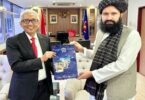KABUL (Tolo News): Reporters Without Borders (RSF) said journalists and media workers in Afghanistan are facing increasing ‘harassment’ from the intelligence department and are under pressure from the Ministry for the Propagation of Virtue and the Prevention of Vice.
RSF said the threats, interrogations and arbitrary arrests of journalists have increased. These actions are in violation of Afghanistan’s press law, it said. According to RSF, since the Islamic Emirate regained power in August last year, at least 50 journalists and media workers have been detained, lasting from several hours to nearly a week.
“Threatening to rip out journalists’ tongues in order to prevent them from covering certain subjects is completely unacceptable,” said Reza Moini, the head of RSF’s Iran-Afghanistan desk. “Journalists must be able to practice their profession without being under a permanent threat of arrest and torture. These unlawful threats, which violate Afghanistan’s media legislation, are all the more horrifying for coming at a time of growing harassment and increasingly restrictive rules for the right to news and information.” According to RSF, the Ministry for the Propagation of Virtue and the Prevention of Vice has also issued a decree in November last year defining certain rules for media in Afghanistan.
The International Federation of Journalists also raised concerns on the status of media in Afghanistan, saying at least 318 media outlets have closed since the fall of the Western-backed government in 33 of 34 provinces in Afghanistan. “The crisis has hit newspapers the hardest with just 20 out of 114 continuing to publish,” the report read. “51 TV stations, 132 radio stations and 49 online media outlets have ceased operations according to the report compiled for the IFJ.”
The Islamic Emirate, however, reacting to these reports, said it is committed to supporting press freedom. “The Islamic Emirate is committed to freedom of the press. The media have also an obligation to stay impartial and remain committed to religious and national values,” Islamic Emirate spokesman Zabihullah Mujahid said on Twitter. He said the Islamic Emirate is trying to remove obstacles in the way of media. Meanwhile, at least 318 media outlets have closed since the fall of the Western-backed government in 33 of 34 provinces in Afghanistan, the International Federation of Journalists (IFJ) said.
The IFJ in a report expressed concerns over the status of Afghan media community. “The crisis has hit newspapers the hardest with just 20 out of 114 continuing to publish,” the report read. “51 TV stations, 132 radio stations and 49 online media outlets have ceased operations according to the report compiled for the IFJ.”
Based on the report, only 2,334 journalists are still employed “from a pre-Taliban high of 5069.” 72 percent of journalists who lost their jobs are women, according to the IFJ. “243 women are still employed by the media.” “From threats to draconian reporting restrictions and from economic collapse to the withdrawal of development funding the picture is catastrophic, not just for journalists who have lost their jobs or been forced to flee but also for citizens who are being denied access to information,” IFJ General Secretary Anthony Bellanger said. The Afghan media community called on the Islamic Emirate to help the media gain access to information.
“If the immediate steps are taken towards the situation of the media in the country, only some certain number of media organizations will be active in Afghanistan in the near future,” said Hujatullah Mujadidi, head of the Head of the Afghan Independent Journalists Association. “We call on the international community to invest in media to protect the process of access to information in the current Afghan situation,” said Hafizullah Barakzai, head of the Afghanistan Journalists Council.
Some journalists called on the international community to address the collapse of the Afghan media community. “If the restrictions imposed on media remain in force, the media organizations will stop operating and will collapse,” said Samiullah Pam, a journalist.
“We call on the international community to seriously consider the situation of the Afghan media. We call on the government to assist with the media in access to information,” journalist Naseem said. This comes as the Islamic Emirate announced earlier that the Media Violation Commission and a Joint Commission of media and the government would be established soon. Talking at a conference in Kabul, Islamic Emirate’s Spokesman Zabiullah Mujahid said that the the Mass Media Law of Afghanistan is still enforceable.






